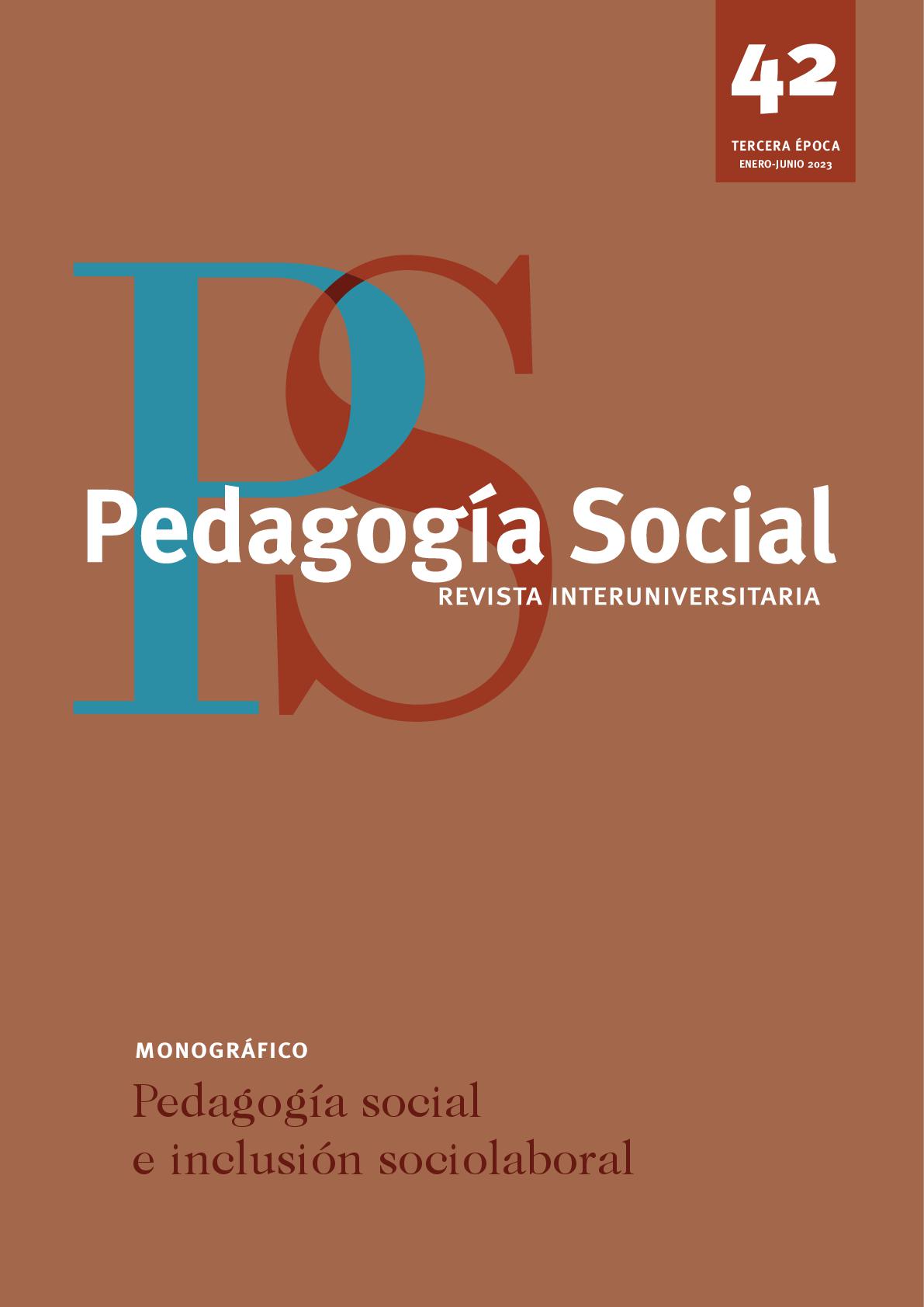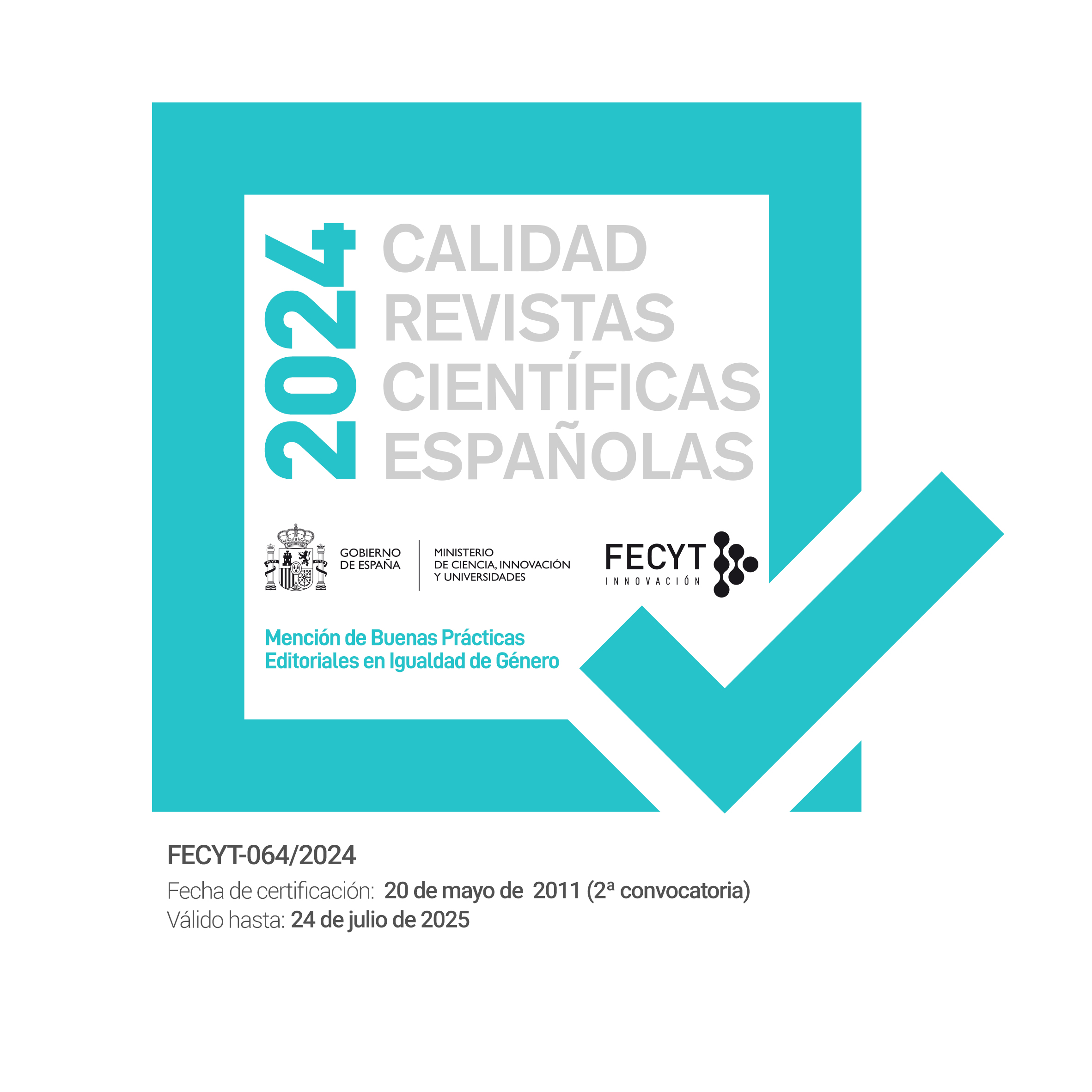Processes of socio-educational support and adaptation to life in freedom in punished women
DOI:
https://doi.org/10.7179/PSRI_2023.42.13Keywords:
professional accompaniment, socio-educational action, reinsertion, prison, gender, prison treatmentAbstract
From the educational field, the penitentiary environment can constitute an institutional space oriented to socio-educational action for the re-education and in-reintegration of convicted persons. Professional accompaniment involves a process of action that promotes, among other things, autonomy and empowerment for life in freedom. This is developed by different professionals or personnel linked to the environment, distinguishing intra-penitentiary and extra-penitentiary actions. However, convicted women experience institutional inequalities due to their low population presence, specific personal characteristics, etc., limiting their professional support and reintegration. This article analyzes the perceptions of penitentiary professionals and convicted women about the accompaniment processes carried out and the adaptation to their socio-personal characteristics for the best in-reintegration. A national investigation was carried out with a sample of 756 convicted women and 109 prison professionals within the framework of two R+D+i projects. Mixed questionnaires were applied to both types of sample and semi-structured interviews were applied to women. A bivariate descriptive statistical analysis was performed for the quantitative data and a content analysis for the qualitative data. The results showed that the accompaniment processes are developed mostly by non-penitentiary professionals in the ordinary regime (84.6%), being the ones that most consider the socio-personal needs of women, especially educational levels and drug addictions. Convicted women presented difficulties for the continuity of accompaniment processes in an open regime, since these actions are received only by 51.6%, highlighting addicted women (58.3%) and victims of gender violence (63.6%). Likewise, 38.7% demanded social and labor insertion programs and 31.2% individualized interventions. However, there were limitations in the socio-educational action with a gender perspective and the scope of professional support actions in the open regime, which prevents an adequate adaptation of women to life in freedom.
Downloads
References
Almeda, E. (2017). Criminologías feministas, investigación y cárceles de mujeres en España. Papers: revista de sociología, 102(2), 151-181. http://dx.doi.org/10.5565/rev/papers.2334 .
Amaro, A., Berzosa, C., Alcázar-Campos, A., & García-Vita, M. (2021). Acompañamiento profesional para la reinserción e inclusión social de mujeres en semilibertad. Psychology, Society & Education, 13(2), 77-86. https://doi.org/10.25115/psye.v13i2.3471
Añaños, F. (2012). Violencias y exclusiones. Enfoque socio-educativo y de la paz. Convergencia. Revista de Ciencias Sociales, 19(59), 13-41.
Añaños, F. (2013). Formación educativa previa ante las discriminaciones: las mujeres reclusas en España. Revista de educación, (360), 91-118. http://dx.doi.org/10.4438/1988-592X-RE-2013-360-222
Añaños, F., Fernández-Sánchez, M., & Llopis, J. (2013). Aproximación a los contextos en prisión: una perspectiva socioeducativa. Pedagogía social: revista interuniversitaria, (22), 2-16. http://dx.doi.org/10.7179/PSRI_2013.22.02
Añaños, F., & García-Vita M. (2019). Gender issues around female criminality. En V. Pérez de Guzmán, E. Bas y M. Machado-Casas (Eds), Gender issues. Multidisciplinary perspectives (pp. 231-253). Peter Lang Publishing. https://doi.org/10.3726/b14951
Añaños, F., García-Vita, M., Galán, D., & Raya-Miranda, R. (2020). Dropout, Autonomy and Reintegration in Spain: A Study of the Life of Young Women on . Frontiers in Psychology-Educational Psychology, 11(1359), 1-15. https://doi.org/10.3389/fpsyg.2020.01359
Añaños, F., Gil, F., Raya-Miranda, R., & Soto, F. (2021). Estudiar en prisión: la situación actual de las mujeres en contextos penitenciarios españoles. Psychology, Society, & Education, 13(1), 115-121. http://dx.doi.org/10.25115/psye.v1i1.3494
Añaños, F. (2022). Hacia modelos socioeducativos y de desarrollo humano. Claves para la inserción-reinserción social penitenciaria. En F. Añaños, M. García-Vita, & A. Amaro (coords.), Justicia social género e intervención socioeducativa. Medio penitenciario y contextos delictivos (Vol. I. pp. 77-92). Pirámide.
Añaños, F., Burgos, R., & Moles, L. (en prensa). Factor laboral y económico. En F. Añaños, R. Burgos, E. Moles-López, M García-Vita, M. Martín-Solbes, R. Raya-Miranda, K. Añaños, D. Galán, M. Rivera, & B. García (eds), Tránsitos y retos de la inserción-reinserción social con mujeres en semilibertad. Propuestas socioeducativas (pp. 76-90). Secretaria General de Instituciones Penitenciarias.
Burgos, R., Tardón, B., Martín-Solbes, V., & Pozuelo, F. (2021). El enfoque de género en la intervención socioeducativa con mujeres: un estudio en el medio penitenciario Español. Psychology, Society & Education, 13(1), 73-83. http://dx.doi.org/10.25115/psye.v1i1.3474
Canadá, K., Barrenger, S., Robinson, E., Washington, K., & Mills, T. (2019). A systematic review of interventions for older adults living in jails and prisons. Aging & Mental Health, 24(7), 1019-1027. https://doi.org/10.1080/13607863.2019.1584879
Caride, J., & Gradaílle, R. (2013). Educar en las cárceles: nuevos desafíos para la educación social en las instituciones penitenciarias. Revista de educación, 360, 36-47. https://doi.org/10.4438/1988-592X-RE-2013-360-219
Constitución Española (1978). Publicada en BOE de 29 de diciembre de 1978.
Curtis, M., Winter, R., Dietze, P., Wilkinson, A. L., Cossar, R., Stewart, A., & Stoové, M. (2022). High rates of resumption of injecting drug use following release from prison among men who injected drugs before imprisonment. Addiction, 1-12. https://doi.org/10.1111/add.15971
De Miguel, E. (2015). Mujeres usuarias de drogas en prisión. Práxis sociológica, (19), 141-159.
Del Pozo Serrano, F., & Añaños, F. (2013). La Educación Social Penitenciaria: ¿De dónde venimos y hacia dónde vamos? Revista complutense de educación, 24(1), 47-68. http://dx.doi.org/10.5209/rev_RCED.2013.v24.n1.41191
Galán, D., Ramos-Ábalos, E., Turbi, A., & Añaños, F. (2021). Salud mental y consumo de drogas en prisiones españolas. Una perspectiva de género. Psychology, Society & Education, 13(1), 85-98. https://doi.org/10.25115/psye.v1i1.3478
García-Vita, M., & Melendro, M. (2013). El ambiente en prisión: La atención recibida por las reclusas y las relaciones intramuros. Pedagogía social: revista interuniversitaria, (22), 4-14. https://doi.org/10.7179/PSRI_2013.22.04
Gomes, E., & Silva, R. (2020). Representações sociais da ressocialização através da Educação: a prisão pode constituir-se em espaço educativo? Dialogia, 34, 153-166. https://doi.org/10.5585/Dialogia.N34.16702
Janer, Á., & Úcar, X. (2020). Una anàlisi comparativa internacional sobre la pràctica professional de la pedagogia social. Educació social. Revista d’intervenció socioeducativa, 76, 83-108.
Jones, M., Worthen, M., Sharp, S., & McLeod, D. (2018). Bruised inside out: The adverse and abusive life histories of incarcerated women as pathways to PTSD and illicit drug use. Justice Quarterly, 35(6), 1004-1029. https://doi.org/10.1080/07418825.2017.1355009
Juliano, D. (2010). Delito y pecado. La transgresión en femenino. Política y sociedad, 46(1), 79-95.
Loinaz, I., & Andrés-Pueyo, A. (2017). Victimización en la pareja como factor de riesgo en mujeres en prisión. Revista Criminalidad, 59(3), 153-162.
Martín-Solbes, V, Añaños, F., Molina-Fernández, E., & Burgos, R. (2021). The Professional Dimension in Spanish Prison Socio-Educational Action. Education Sciences, 11(10), 585. https://doi.org/10.3390/educsci11100585
Montero, E. (2019). La reeducación y la reinserción social en prisión: El tratamiento en el medio penitenciario español. Revista de Estudios Socioeducativos. ReSed, 7, 227-249. http://dx.doi.org/10.25267/Rev_estud_socioeducativos.2019.i7.16
Oficina de las Naciones Unidas contra la Droga y el Delito (2019). Manual introductorio sobre prevención de la reincidencia y reintegración social de los delincuentes. https://www.unodc.org/documents/dohadeclaration/Prisons/HandbookPreventionRecidivism/18-02306_S_ebook.pdf
Organización de Naciones Unidas. (2004). Los derechos humanos y las prisiones. Nueva York y Ginebra: Oficina del Alto Comisionado de las Naciones Unidas para los Derechos Humanos.
Oveisi, S., Stein, L., Babaeepour, E., & Araban, M. (2020). The impact of motivational interviewing on relapse to substance use among women in Iran: a randomized clinical trial. BMC psychiatry, 20(157), 157. https://doi.org/10.1186/s12888-020-02561-9
Pereira, Z. (2011). Los diseños de método mixto en la investigación en educación: Una experiencia concreta. Revista electrónica educare, 15(1), 15-29.
Pérez, V., Trujillo, F., & Bas, E. (2020). La educación social en España: claves, definiciones y componentes contemporáneos. Revista Colombiana de Ciencias Sociales, 11(2), 632-658. https://doi.org/10.21501/22161201.3095
Reglamento Penitenciario (1996). Real Decreto 190/1996, Reglamento Penitenciario, de 9 de febrero.
Ruiz-García, M., & Castillo-Algarra, J. (2014). Experiences of foreign women in Spanish prisons. Journal of Offender Rehabilitation, 53(8), 587-599. http://dx.doi.org/10.1080/10509674.2014.956966
Secretaría General de Instituciones Penitenciarias. (2019). Instrucción 2/2019, de 7 de febrero de la Secretaría General de Instituciones Penitenciarias “Intervención de Organizaciones No Gubernamentales, Asociaciones y Entidades Colaboradoras en el Ámbito Penitenciario”. https://www.iipp.es/documents/20126/0/I_2-2019_Intervencixn_ONGs-Entidades-Anexos.pdf/3329655f-8a2a-1432-da51-650498df96ab
Secretaría General de Instituciones Penitenciarias. (2022a). La administración penitenciaria: Fines y principios. https://www.iipp.es/es/web/home/administracion-penitenciaria/fin-y-principios
Secretaría General de Instituciones Penitenciarias. (2022b). La administración penitenciaria: Recursos humanos, puestos de trabajo. https://www.iipp.es/es/web/home/administracion-penitenciaria/recursos-humanos/puestos-de-trabajo
Secretaría General de Instituciones Penitenciarias. (2022c). Reeducación y reinserción social. https://www.iipp.es/es/web/home/reeducacion-y-reinsercion-social
Silva, S., & Apoluceno, I. (2018). Educação de Jovens e Adultos no Sistema Prisional: Reinserção social de Mulheres. Práxis Educacional, 14(29), 88-105. https://doi.org/10.22481/praxis.v14i29.4100
Van der Put, C., Assink, M. & Gubbels, J. (2020). Differences in risk factors for violent, nonviolent, and sexual offending. Journal of forensic psychology research and practice, 20(4), 341-361. https://doi.org/10.1080/24732850.2020.1735248
Van Hout, M. & Wessels, J. (2021). Human rights and the invisible nature of incarcerated women in post-apartheid South Africa: Prison system progress in adopting the Bangkok Rules. International Journal of Prisoner Health, 18(3), 300-315. https://doi.org/10.1108/IJPH-05-2021-0045
Villagrá, P., González, A., Fernández, P., Casares, J., Martín, J., & Rodríguez, F. (2011). Perfil adictivo, delictivo y psicopatológico de una muestra de mujeres en prisión. Adicciones, 23(3), 219-226.
Yagüe, C. (2007). Mujeres en prisión. Intervención basada en sus características, necesidades y demandas. Revista española de investigación criminológica, 5, 1-23.
Downloads
Published
How to Cite
Issue
Section
License

This work is licensed under a Creative Commons Attribution-NonCommercial-ShareAlike 4.0 International License.
Copyright and right to archive
The published version of the articles can be self-archived by their authors in open access institutional and thematic repositories. However, Pedagogía Social. Revista Interuniversitaria must authorize partial or global reutilisation on new papers or publications.
Published papers must be cited including the title of the journal Pedagogía Social. Revista Interuniversitaria, issue, pages and year of publication
Ethical responsibilities
Pedagogía Social. Revista Interuniversitaria does not accept any material that has been previously published in other documents or publications. Authors are responsible for obtaining the required permissions for partial or global reproduction any material from other publications, and to correctly quote its origin.
Pedagogía Social. Revista Interuniversitaria is obliged to detect and report fraudulent practices.
Only those who have intellectually contribute to the development of the paper must appear as authors.
The journal expects authors to declare any commercial partnership that might entail a conflict of interest with respect to the submitted article.
Authors must mention in the article, preferably in the “methodology” section, that the procedures used during the samplings and controls have been made after getting informed consent.
The journal will not use any received contribution in a way other than the goals described in these guidelines.
Copyright Notice
© Pedagogía Social. Revista Interuniversitaria. Papers published in both the printed and online versions of this Journal are property of Pedagogia Social. Revista Interuniversitaria, being required to cite the source in any partial or total reproduction.
Unless otherwise stated, all content of this electronic journal is distributed under "Creative Commons Attribution-Non commercial 3.0 Spain" (CC-by-nc) license for use and distribution. The informative version and the legal text of this license is available here. This has to be expressly stated in this way when necessary.







